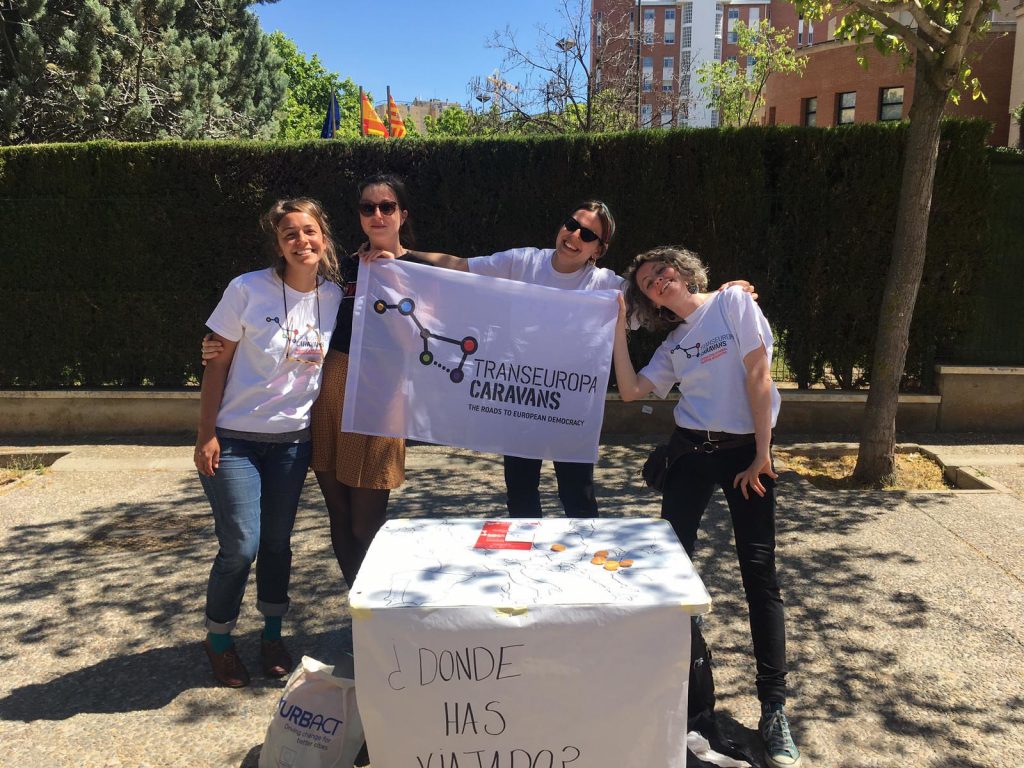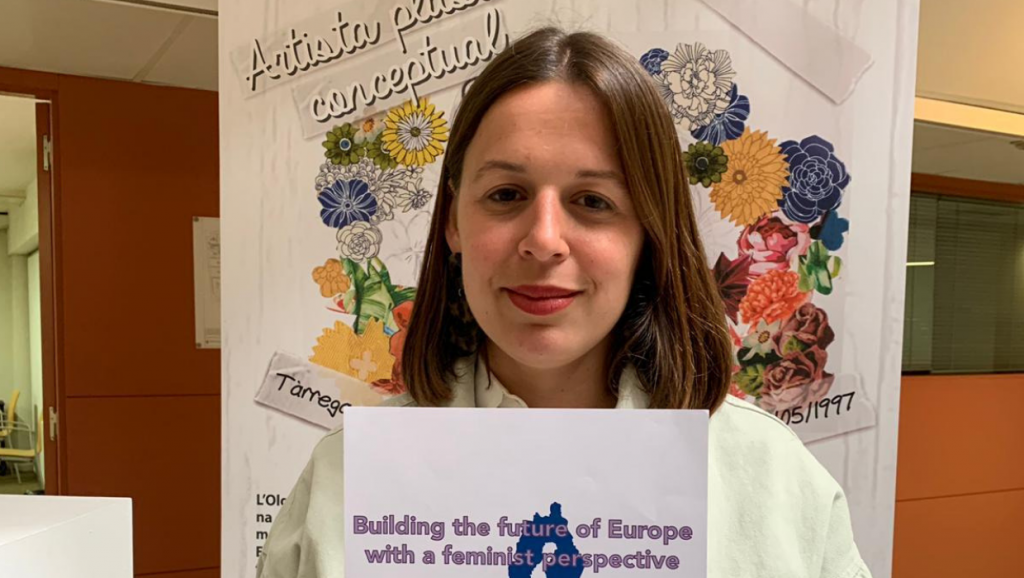European Alternatives activist Antje Scharenberg interviews Adriana Díaz Martín-Zamorano, communications officer of the Western Caravan.
What is your personal route, how did you get here?
I think my relationship with Europe started at the age of 15. I got involved with the European Youth Parliament, which is a youth organisation that brings together young people from across Europe to discuss European topics. I lived in Sant Cugat del Vallès, a middle-class city, thirty minutes away from Barcelona. Back then in Spain, the European Youth Parliament was a project that only a few schools knew about, which sent a selection of students to international sessions; it was an exclusive project. In 2006, I went to my first session in the Ukraine, in Kiev. This was the first time I travelled outside of Spain – other than Andorra and Portugal – at quite a late age I would say. Going to the Ukraine, a country that was quite different from the one I’m from, was really fascinating. The whole session was a very important experience for me, because it was also the first time I had to articulate myself in English. I did not have many interactions with foreigners before then. This kind of experience opened up a whole new world for me, because I realised, first of all, that I was passionate about young people being engaged, and that I personally cared. I also realised how enriching it is to get to know people from other countries. Of course, this experience came with some frustrations. For example, my English was super bad and I felt very limited. It was a bit of a struggle, but what was interesting was that despite it being a struggle, I remained engaged for 8 years. During these 8 years, I was secretary of the organisation for 2 years, and later became president at the very young age of about 20. That year, it was 2011, was one of the happiest of my life. Not because of the “power”, I don’t really care about that, but because of what we achieved together as a group of engaged young students who cared to fight for a more inclusive project. We managed to create a national committee, to register it legally, to get more and more schools involved. Today, hundreds of schools in Spain are part of the project. It was really empowering for me, this experience that you can have an impact on the people around you. This was a very nice feeling, and it influenced the rest of my personal, professional and academic life.

The second pillar that shaped the person I am today is related to my studies. I studied journalism as a Bachelors in Barcelona, while living with my parents. During my Bachelors, I didn’t do Erasmus, because I wanted to do my Masters abroad. I knew I wanted to do something related to European politics, but I also didn’t want to leave the field of communication. I found this Erasmus Mundus Masters entitled Journalism, Media and Globalisation, which I chose because of the specialism in Amsterdam that was about “Communicating Europe”, which combined media and politics. More than the academic aspect, it was on a personal level that this experience really shaped me. In Denmark, where the programme first took me to, it was the first time I lived abroad and without my parents. I am a sociable person, but I was worried I wouldn’t find people to connect with. Then I met some of my best friends now, who are all from different countries and who really share my common interests – a group of people who love to talk about politics, cinema, music, literature, social movements, and who would constantly discuss ideas with each other. This really fulfilled me. It was really soul-healing to find these people with whom I belong together in a way.
I saw the call for Transeuropa Caravans and I thought: this is the kind of project I wanted to be involved with.
After the Masters, I thought Brussels was a logical place to live, because there is a lot going on in terms of European politics. I first did an internship and then ended up being communications adviser for the ALDE party, working there for three years. It was good to be part of the EU bubble, because I was interested in seeing how it works. When working in media before, I realised that most media serve economic and political interests. Then I tried political communications, which, in the end, is also, as expected, partisan and biased. At this point, I didn’t necessarily see myself returning to Spain. Some people who live outside of their countries always wonder whether they want to go back, but for me it was a thought that never crossed my mind. I thought I’m happy abroad, I found myself, so why should I have to return. But then, one Christmas when I stayed at home for a few weeks, I realised that the people around me back home have also changed. I thought maybe I could go back to Barcelona and also be open to new circles, not always only to be with the people I knew from before. I could approach the area I’m from with the mentality of bringing back what I learned while being abroad. I didn’t want to be rushed, so I allowed myself some time to see if this feeling stayed and it did. This feeling, together with a friend approaching me with the proposal to open up a communications agency – which was something I wanted to try at some point – was part of the reason why I moved back to Catalonia. It was in this context that I saw the call for Transeuropa Caravans and I thought: this is the kind of project I wanted to be involved with.

What was one of your highlights on the Western route thus far?
One organisation that really touched my soul was this grandmothers’ organisation we visited in Lisbon, called A Avó veio trabalhar. It’s a project in which grandmothers come together to work on crafts, but not in a way they would normally do it. There are two young people there who manage the project, giving them tips on what they could work on and how to sell those crafts. The whole point about this project is to empower old people. Besides doing crafts, they’ve been promoting their art in music festivals, they’ve been models during the Lisbon fashion week, they’re enacting an idea of active grandmothers. It was very moving and empowering, not only because of the things they were saying and how they welcomed us. You could feel that they love being with people. When speaking to them we found out that many of the women had lost their husbands and how the organisation has helped them to get through this difficult time. They were saying that when you get older, you lose family, but here they have won family. They really came across like a family, taking care of each other, supporting each other emotionally and also in their work.
This idea of being old, but still motivated and active and to feel that you belong to society and that you are not excluded was very nice. It also made me realise that, actually, getting old is not such as bad thing. When you get old and officially retire, it doesn’t mean your life has to end. You can still be useful for society and still have a purpose. It is very important that as a society, we make sure these people are included. It’s thanks to organisations like this that people find a purpose in life. I even considered that something like this could work well in Barcelona, and that I should motivate friends to do it there as well. Meeting these grandmothers gave me food for thought but it also motivated me to try and do something about it, to get inspired by it and bring organisations like this to other cities.
What have you learned from the caravan trip, what will you take away?
Above all, I think it was inspiring. One of the most interesting things was to see that even in a time when the far-right is emerging and people tend to be more negative than positive, you find that, on a local level, there are really great initiatives. It is encouraging to see how they actually do a lot for the society around them and I think it is our duty to be part of this and to even further by expanding these good practices as good as we can. I think Transeuropa Caravan was really an example of this, of how we can go and see these organisations to then spread the word and maybe influence a friend. They could end up opening an organisation like the one working with grandmothers in Lisbon, or a friend who is politically engaged could be motivated to start something like Marea Atlantica in A Coruña.
Many of my friends act individually and think that’s enough, for example being vegetarian or using less plastic. It’s good to do all these things, but for me it should go hand in hand with a greater ambition, or at least the aim to have an impact on the people around you. I personally don’t aim to change the world. But I do aim to have an impact on the people around me. If I can make them conscious or aware of a good cause, for me this is already enough and fulfilling. It’s my personal fight. I think ideally if we would all do this, then we would really move towards building a better world. Maybe this is too idealistic, but as a young person I think I am entitled to think like that.

